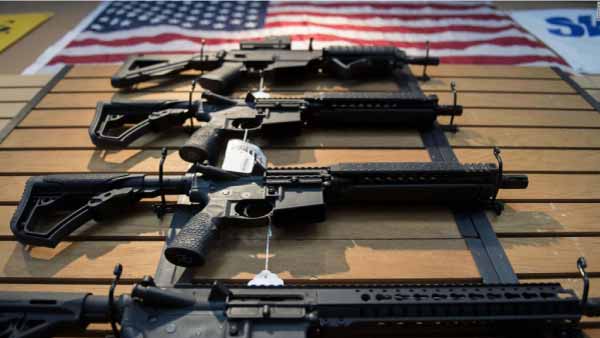Gun control is a complex and controversial issue that addresses policies, laws, and regulations related to the manufacture, sale, possession, and use of firearms. The primary goal of gun control is to reduce gun violence and protect public safety.
There are different approaches to how gun control should be conducted. Some common measures include:
Background checks
This is a process that is done before the purchase of a gun, with the goal of making sure that the person acquiring it does not have a criminal or psychiatric history that prevents them from having a gun.
Weapons Registration
Registration involves maintaining a centralized registry of all weapons that are sold, bought, or transferred in a jurisdiction. This can help authorities trace the origin of a weapon and prevent its illegal use.
Assault weapons ban
Assault weapons are firearms designed for military use, which can fire fast and accurate bursts of fire. Many countries have banned the possession of these weapons for the general public, with the aim of reducing armed violence.
Restriction of charger capacity
Magazine capacity refers to the amount of ammunition a weapon can hold in a single magazine. By restricting the capacity of the magazine, the number of shots an attacker can make without having to reload can be reduced.
Age restriction
Many jurisdictions impose age restrictions on gun ownership, with the goal of preventing access to guns by minors or immature individuals.
Importantly, gun control is a complex issue and there are many debates around the effectiveness and implementation of different measures.
Background checks
Background checks are a process that is done before the sale of firearms, with the goal of making sure that the person acquiring them does not have a criminal or psychiatric history that prevents them from having a gun. This process is a gun control measure that seeks to prevent the sale of weapons to people who pose a risk to public safety.
In many countries, including the United States, background checks are a legal requirement for purchasing firearms from gun stores and fairs. During the process, the buyer must complete a form that includes personal information and criminal and mental health records. This information is sent to law enforcement or a government background check agency, which conducts a thorough review of available records to determine if the buyer is eligible to purchase a firearm.
Importantly, background checks are not a foolproof measure and there may be loopholes in the system that allow some dangerous people to obtain firearms. However, many gun control advocates consider background checks to be an important measure to prevent gun violence and protect public safety.
Weapons Registration
Gun registration is a process of maintaining a centralized registry of all weapons that are sold, purchased, or transferred in a jurisdiction. The primary purpose of the gun registry is to improve public safety by making it easier to identify weapons used in crimes and prevent their illegal use.
The gun registry may include information such as the serial number of the weapon, its make and model, the name and address of the owner, and the date of purchase. In some countries, such as Canada, gun registration is mandatory and all firearms must be registered. In other countries, such as the United States, gun registration is not mandatory at the federal level and the responsibility for maintaining records lies with state and local authorities.
Gun control advocates argue that gun registration is an important measure to prevent gun violence, as it allows authorities to trace the origin of a weapon used in a crime and assist in investigation. However, some opponents argue that gun registration can be costly and ineffective, and that it can violate the constitutional rights of gun owners.
Importantly, gun registration is a controversial measure and its implementation varies significantly in different countries and jurisdictions.
Assault weapons ban
The assault weapons ban is a gun control measure that involves prohibiting the possession and sale of firearms designed for military use, which can fire fast and accurate bursts of fire. These weapons often have a high magazine capacity and are considered especially dangerous in situations of armed violence.
The assault weapons ban has been implemented in different countries as a measure to reduce gun violence. For example, in Australia, an assault weapons ban was implemented following the Port Arthur shooting in 1996, which left 35 people dead. Since then, there has been a significant reduction in mass shootings in the country.
In the United States, the assault weapons ban was implemented in 1994, but expired in 2004 and has not been renewed. Gun control advocates argue that the assault weapons ban is an important measure to prevent gun violence and should be reinstated. However, opponents argue that the ban is not effective and violates the constitutional right to bear arms.
Importantly, the definition of “assault weapon” can vary between different jurisdictions and that there are debates about what types of weapons should be considered “assault weapons.” In addition, some critics argue that mass shootings are caused by a combination of more complex factors than simply possession of assault weapons, and that broader measures are needed to address gun violence.
Restriction of charger capacity
Magazine capacity restriction is a gun control measure that involves limiting the amount of ammunition a firearm magazine can hold. This measure aims to reduce the number of shots a shooter can make before having to reload their weapon, which can be especially useful in situations of gun violence.
In many countries, including the United States, gun control laws set limits on the capacity of gun magazines. For example, in some U.S. states, the maximum capacity of magazines is 10 rounds. There are also proposals to establish nationwide charger capacity restrictions in the United States.
Gun control advocates argue that restricting magazine capacity is an important measure to prevent gun violence and reduce the number of victims in mass shootings. By limiting the number of shots a shooter can make before having to reload, an attacker’s effectiveness in a mass shooting is reduced and individuals can be given more time in place to escape or hide.
However, opponents argue that restricting the magazine’s capacity violates the constitutional right to bear arms and is not effective in preventing gun violence, since an attacker can always have multiple magazines with it. In addition, some argue that this measure may be difficult to apply in practice, as many magazines have adjustable capacity and can be modified to hold more ammunition.
Age restriction
Age restriction is a gun control measure that involves limiting the age at which a person can buy or possess a firearm. The minimum age to purchase and possess firearms varies in different countries and jurisdictions.
In the United States, the federal minimum age to buy a handgun is 21, while the minimum age to buy a rifle is 18. However, some states have set a higher minimum age for the purchase of firearms. For example, in California, the minimum age to buy any type of firearm is 21.
Gun control advocates argue that age restriction is an important measure to prevent gun violence and reduce the number of guns in the hands of young, immature people. By setting a minimum age for the purchase and possession of firearms, it is hoped to reduce the number of shootings in schools and other public places.
However, opponents argue that the age restriction violates the constitutional right to bear arms and is not effective in preventing gun violence, since many guns used in mass shootings are obtained illegally or through friends and family. In addition, some argue that young adults should have the same right to own firearms as older adults, since they are able to serve in the military and vote at age 18.


